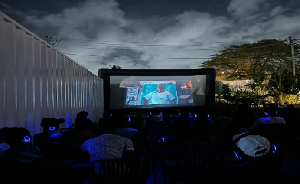The recent screening of the film Possible in Accra celebrated the powerful storytelling of African filmmakers and the ambitious vision of Matatu Film Stage.
Over two days, attendees experienced a lineup of eight diverse films, sparking conversation around the transformative potential of African cinema.
Patience Asaba Kutashabe, programs producer at Matatu Film Stage, shared insight into their distribution vision across Africa and beyond.
“Matatu Film Stage is a distribution platform that’s expanding across Africa and the world at large. Our goal is to make African films accessible, especially to those who lack access to cinemas,” she explained.
Kutashabe noted the importance of balancing diverse African stories that, while rooted in unique cultural backgrounds, share universal themes.
“We aim to create films that provoke thought and dialogue, challenging societal norms.”
Kutashabe, who also produced The Last Shoemaker which was directed by Ali Musoke highlighted the film’s exploration of neocolonial themes, depicted through a story about exploitation disguised as assistance.
Another standout from the screening was Jangu, directed by Patience Nitumwesiga and produced by Shagika Tales Productions and Stone Age Pictures.
The film tells the surreal tale of two sisters robbed at night, only to have their world altered by dawn after a mystical encounter with a witch.
Another significant piece was Nyame Mma, a short film by Joewackle J. Kusi.
This powerful exploration of loss, identity, and societal pressures within a grieving family struck a deep chord with audiences.
Kusi praised the event, saying, “Matatu Film Stage is a crucial platform for us filmmakers. Having spaces to screen our work is essential, and events like these with strong turnout are what we need more of.”
The Barn Door Beergarden event ended on a high note, affirming Matatu Film Stage’s commitment to amplifying African cinema and giving local stories a place on the global stage.
Having already screened in Kenya, Uganda, Tanzania, and Ghana, the team plans to bring their next editions to South Africa, Rwanda, and Dubai, further extending the reach of African narratives.



